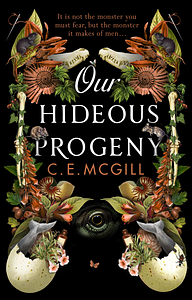You need to sign in or sign up before continuing.
Take a photo of a barcode or cover
challenging
dark
mysterious
medium-paced
Plot or Character Driven:
A mix
Strong character development:
No
Loveable characters:
Complicated
Diverse cast of characters:
Yes
Flaws of characters a main focus:
Yes
Truly loved this book. Mary is such a strong female protagonist at a time when women were meant to be seen and not heard. I felt like Masie and her Penny Dreadfuls at certain points when I imagined the worst was going to happen. I beg you to read the author’s note. The last paragraph 👩🍳💋
adventurous
challenging
slow-paced
Plot or Character Driven:
Plot
Strong character development:
Yes
Loveable characters:
Yes
Diverse cast of characters:
Yes
Flaws of characters a main focus:
No
dark
mysterious
reflective
slow-paced
Plot or Character Driven:
A mix
Strong character development:
No
Loveable characters:
Yes
Diverse cast of characters:
No
Flaws of characters a main focus:
Complicated
Even though there were aspects of this book that were a miss for me, Our Hideous Progeny was everything I wanted from Strange Beasts but didn't get (do NOT ever pick up that book what a waste of time).
The science fiction elements were fascinating, and I really enjoyed how C.E. McGill blended together aspects of Frankenstein with paleontology. The dinosaur aspects felt really well researched and I loved seeing how knowledgeable our main character was on the subject. The construction of the creature felt like a melding of Guillermo del Toro's Shape of Water with Steven Spielberg's Jurassic Park, tackling topics of scientific morality and scientist's complicit nature in the monsters they create.
The characters were interesting, but with the bland and one-note characterization, all the actions committed by all the characters felt very predictable, and I felt like I knew the ending of the story by the 15% mark. In particular, the grief Mary had surrounding her child felt very touch and go, here one moment and gone the next, only to be brought out when convenient. However, I do feel that Mary and her queerness were written fairly well, I enjoyed her sapphic pining and longing, and it was part of the reason I continued with the story despite my misgivings about the rest of the cast.
Overall, a dark and atmospheric book that borders the edge of science fiction, I would recommend this book for sapphics who had a dinosaur phase as a child, but to warn not to expect too much from the character development.
The science fiction elements were fascinating, and I really enjoyed how C.E. McGill blended together aspects of Frankenstein with paleontology. The dinosaur aspects felt really well researched and I loved seeing how knowledgeable our main character was on the subject. The construction of the creature felt like a melding of Guillermo del Toro's Shape of Water with Steven Spielberg's Jurassic Park, tackling topics of scientific morality and scientist's complicit nature in the monsters they create.
The characters were interesting, but with the bland and one-note characterization, all the actions committed by all the characters felt very predictable, and I felt like I knew the ending of the story by the 15% mark. In particular, the grief Mary had surrounding her child felt very touch and go, here one moment and gone the next, only to be brought out when convenient. However, I do feel that Mary and her queerness were written fairly well, I enjoyed her sapphic pining and longing, and it was part of the reason I continued with the story despite my misgivings about the rest of the cast.
Overall, a dark and atmospheric book that borders the edge of science fiction, I would recommend this book for sapphics who had a dinosaur phase as a child, but to warn not to expect too much from the character development.
medium-paced
An atmospherically Gothic and richly researched re-imagining of Mary Shelley's Frankenstein that tells of ambition, sapphic love, and female rage against the thoughtlessness of men and the constraints of patriarchy. A cathartic read for our frustrating times, and also a thought-provoking exploration of the nature of monsters and the relentless pursuit of creation. Best read alongside The Salt Grows Heavy (for more Frankenstein stuff).
adventurous
dark
emotional
reflective
sad
tense
fast-paced
Plot or Character Driven:
A mix
Strong character development:
Complicated
Loveable characters:
Yes
Diverse cast of characters:
Yes
Flaws of characters a main focus:
Yes
Loved this homage to the big "how can men create that which they hate (women)" Frankenstein with its own "how can women love that which society hates (women)" questions -- an excellent book about an angry sapphic scientist. Two bloody thumbs up.
slow-paced
We support women’s wrongs but this was so slow and boring.
adventurous
emotional
hopeful
inspiring
mysterious
medium-paced
Billed as a queer feminist retelling of Frankenstein, which, like… Frankenstein is a pretty queer and feminist text on its own. That’s not McGill’s fault, though, and I can see why publishers have gone for it. Our Hideous Progeny imagines a great-niece of Victor Frankenstein—Mary, a woman with scientific ambitions and a sharp intellect—finding his papers decades down the line and attempting to use his breakthrough to do something that will win her and her husband Henry academic fame and fortune. It’s a great portrait of marital breakdown through incompatibility: Henry’s a jerk, but he’s not evil, and Mary becomes disillusioned with him because of his inability to be a better person than he can get away with being, his constant tiny betrayals of her dignity and ambition in favour of bolstering his own cachet amongst “men of science”. There’s a delicately queer undertone in Mary’s growing friendship with Henry’s sister Maisie, but actually the best rep here is for chronic illness: Maisie is subject to pain and exhaustion that sounds like chronic fatigue or Lyme’s disease, but of course in the 1860s is just “ill health”, and the way she’s treated by her family is a painful but very accurate reflection of the impossibilities of living with such a condition in a time and place that had little vocabulary or conceptual framework for it. Lots here about infant mortality and the guilt and shame of that being unfairly loaded upon women, as well. Honestly, one of the better pieces of neo-Victoriana I’ve read recently, with a convincing grasp of the era, and in some places laugh-out-loud funny. Just really good fun. (Also [spoilers dead ahead] there’s a case to be made that what Mary creates ends up becoming the Loch Ness Monster, which is just the best thing ever.) Source: present from my mum
adventurous
dark
slow-paced
Plot or Character Driven:
A mix
Strong character development:
Complicated
Loveable characters:
No
Flaws of characters a main focus:
Yes
A wonderful riff on "Frankenstein", with outspoken protagonist Mary Sutherland, (great niece of Victor Frankenstein), who is frustrated by society's expectations and her thwarted hopes of practicing as a scientist. She edits and illustrates her gambling addict husband Henry's geology papers, and though not allowed to formally contribute to the rising scientific conversations in Europe, has a good understanding of his and others' work. His peers do not like her for her forthright behaviour, and have a growing distaste for appeals for money.
One day, Mary finds her great uncle's writings about his dreadful experiments, and she begins to decipher them, and wonders if his work can be built upon.
When Henry finds himself out of work, they need something to turn their fortunes around. Two opportunities fall into their laps (his father's death and Vic's notes), they decide to move to Henry's childhood home in Scotland and embark on a new (for them), daring scientific course in paleontology, something all the great men in science are fascinated by. Mary and Henry hope that with their attempt to create a living creature, using Victor's notes, they will make their names, and find respect and wealth.
Gradually, and with the help of one of Henry's friends, who is also Mary's adolescent tormenter, they create a creature using a variety of dead animals' parts. While the men see the creature as just a vehicle for their fame and wealth, Mary develops a love and connection to the creature.
Mary also becomes friends with Henry's younger, ill sister, which irritates Henry to no end. This isn't his only problem with Mary, as no matter what he tells himself, Mary is the better scientist, is smarter than him and has found more success in their current attempts, and she disagrees with his desire to exploit the creature, all of which drive him away from her.
Despite the near constant misogyny that Mary experiences from so many around her, she shines throughout this marvellous novel. The prose amply illustrates the frustrations of an intelligent woman unable to do what she loves, while also being a great addition to the Frankenstein story. With the inclusion of kind Mr. Jamsetjee, author C.E. McGill also describes the barriers in place for those, despite their education, could not achieve much because of the colour of their skin.
I will definitely keep watch for more by this author, as I thoroughly enjoyed this book.
One day, Mary finds her great uncle's writings about his dreadful experiments, and she begins to decipher them, and wonders if his work can be built upon.
When Henry finds himself out of work, they need something to turn their fortunes around. Two opportunities fall into their laps (his father's death and Vic's notes), they decide to move to Henry's childhood home in Scotland and embark on a new (for them), daring scientific course in paleontology, something all the great men in science are fascinated by. Mary and Henry hope that with their attempt to create a living creature, using Victor's notes, they will make their names, and find respect and wealth.
Gradually, and with the help of one of Henry's friends, who is also Mary's adolescent tormenter, they create a creature using a variety of dead animals' parts. While the men see the creature as just a vehicle for their fame and wealth, Mary develops a love and connection to the creature.
Mary also becomes friends with Henry's younger, ill sister, which irritates Henry to no end. This isn't his only problem with Mary, as no matter what he tells himself, Mary is the better scientist, is smarter than him and has found more success in their current attempts, and she disagrees with his desire to exploit the creature, all of which drive him away from her.
Despite the near constant misogyny that Mary experiences from so many around her, she shines throughout this marvellous novel. The prose amply illustrates the frustrations of an intelligent woman unable to do what she loves, while also being a great addition to the Frankenstein story. With the inclusion of kind Mr. Jamsetjee, author C.E. McGill also describes the barriers in place for those, despite their education, could not achieve much because of the colour of their skin.
I will definitely keep watch for more by this author, as I thoroughly enjoyed this book.
dark
slow-paced
Plot or Character Driven:
Character
Strong character development:
Complicated
Loveable characters:
No
Diverse cast of characters:
No







